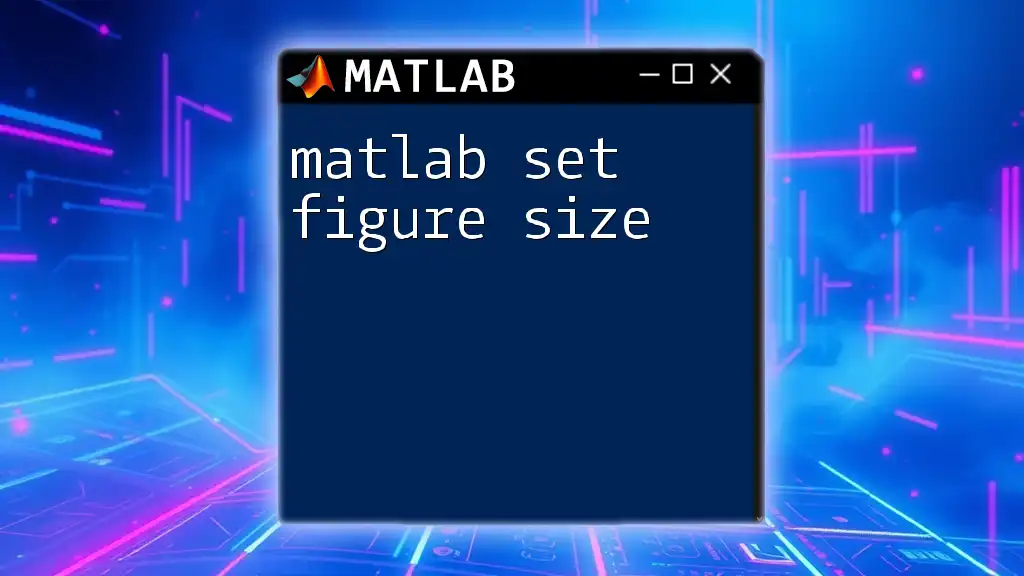The `close` command in MATLAB is used to close figure windows either by specifying the figure number or by closing all open figures at once.
% Close a specific figure by its number
close(1)
% Close all open figures
close all
Understanding MATLAB Figures
What is a Figure?
In MATLAB, a figure is a graphical window where visualizations like plots, graphs, and images are displayed. Figures play a crucial role in data visualization, enabling users to interpret and present their data effectively. Each figure can contain one or more axes, which are the regions in which graphical data is plotted. Understanding figures is fundamental to mastering graphical outputs in MATLAB.
Why Close Figures?
Closing figures efficiently is vital for several reasons.
-
Resource Management: When figures remain open, they consume memory, leading to increased resource usage, which might affect performance, particularly when working with large datasets.
-
User Interface Clarity: Having multiple open figures can clutter your workspace, making it difficult to focus on the relevant data visualizations. Regularly closing unused figures helps maintain a clean environment.
-
Avoiding Cluttered Workspaces: An organized workspace fosters better productivity and helps in keeping track of open figures and their purposes.

The `close` Command Explained
Basic Syntax
The `close` command in MATLAB is straightforward yet powerful. Its basic syntax can be expressed in several ways:
-
To close a specific figure, use:
close(fig)Here, fig is a variable that holds the figure handle you want to close.
-
To close all open figures, simply use:
close all -
To close a figure associated with a handle, you can use:
close(h)
Each variant of the `close` command serves a different function and can be integrated into your workflow according to your needs.
Common Uses of `close`
Closing All Figures
Closing all figures with one command is an effective way to clear your workspace after a lengthy session. Simply utilize:
close all;
This command closes every figure window that is currently open, helping manage memory and organization effortlessly.
Closing Specific Figures
There might be times when you wish to close only a particular figure. The following example demonstrates how to create and then close a specific figure:
h = figure; % Create a new figure
close(h); % Close the specific figure created
Here, h is the handle referencing the figure you just created. Closing figures using their handles is useful as it allows precision in which figures to manage.
Closing Figures by Properties
Closing by Name
If you want to close a figure based on its name, MATLAB provides functionality to do so. Consider this example:
f = figure('Name', 'MyFigure');
% Some plotting code
close(findobj('Type', 'figure', 'Name', 'MyFigure'));
In this example, you create a figure named "MyFigure", plot data, and use `findobj` to locate and close it. This method is efficient when you have multiple figures and want to manage them based on descriptive names.
Closing by Visibility
Sometimes, figures may be created in a non-visible state. You can close invisible figures using:
f = figure('Visible', 'off');
close(findobj('Visible', 'off'));
In this snippet, the figure is created but not displayed. The `findobj` function retrieves all figures that are invisible, which can be particularly helpful in debugging complex graphical code.

Best Practices for Closing Figures
Organizing Workflow
Regularly closing unused figures helps keep your workspace organized. Strive to develop a habit of cleaning up after visualizations, especially when dealing with extensive data analyses where multiple figures can quickly accumulate.
Automating Figure Management
Using clear naming conventions for figures aids in efficient management. For instance, when generating multiple plots, consider incorporating timestamps or unique identifiers into figure names. Additionally, implementing a figure management strategy in scripts can keep your workspace uncluttered and maintain a flow in your workflow.

Troubleshooting Common Issues
Figure Not Closing
At times, you might encounter issues where a figure does not close as expected. Possible reasons can include:
- The figure might be blocked by another running process.
- Incorrect figure handles passed to the `close` command.
To debug, ensure you are using the correct handle or check for active callbacks that might prevent closure.
Memory Leaks from Open Figures
Infrequently closing figures can lead to memory leaks in your MATLAB environment. To detect such leaks, you can monitor system resources or use built-in MATLAB functionalities like the `memory` function. Regular practice of closing figures and managing memory is essential for maintaining optimal software performance.

Conclusion
Managing figures in MATLAB is essential to maintaining an organized workspace and optimizing resource usage. The `close figure` command provides a flexible way to handle your graphical output effectively. Engage regularly with these commands as a practice to refine your MATLAB skills and enhance your data visualization capabilities.

Further Reading
For those seeking to deepen their understanding of MATLAB’s graphical features, consider exploring the official MATLAB documentation on figure management and related topics. Embrace the journey of mastering MATLAB and expanding your capabilities!

















